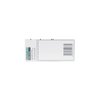This medicine is a brand name for the medication Atenolol, which belongs to a class of drugs known as beta-blockers.
It is primarily used to treat high blood pressure (hypertension), angina (chest pain), and to improve survival after a heart attack.
The 25 mg formulation indicates the dosage strength per tablet, and the packaging typically contains 28 tablets.
Benefits:
-Angina Relief: Helps reduce the frequency and severity of angina attacks by improving blood flow to the heart.
-Heart Rate Control: Slows down the heart rate, which can be beneficial for patients with certain arrhythmias.
-Hypertension Management: Reduces blood pressure, thereby decreasing the risk of stroke and heart attack.
-Post-Myocardial Infarction: Improves survival rates in patients who have suffered a heart attack by reducing workload on the heart.
-Used to lower the risk of death after a heart attack.
Precautions:
-Allergy History: Patients should inform their healthcare provider if they have any allergies to Atenolol or other beta-blockers.
-Medical Conditions: Caution is advised in patients with asthma, chronic obstructive pulmonary disease (COPD), diabetes, or severe kidney problems.
-Pregnancy and Breastfeeding: Consult a healthcare provider before use; Atenolol may affect fetal development or breast milk production.
-Drug Interactions: Inform your doctor about all medications being taken, including over-the-counter drugs and supplements, as interactions may occur.
Side Effects:
-Common side effects include fatigue, dizziness, lightheadedness, depression, and gastrointestinal disturbances such as nausea or diarrhea.
-Serious side effects may include bradycardia (slow heart rate), hypotension (low blood pressure), worsening of asthma symptoms, and severe allergic reactions (anaphylaxis).
-Patients should seek immediate medical attention if they experience symptoms like chest pain, shortness of breath, or swelling in extremities.
Main Ingredients and Their Benefits:
-Atenolol is a selective beta-1 adrenergic antagonist that primarily reduces heart rate and myocardial contractility, leading to decreased cardiac output and lower blood pressure. Atenolol is commonly prescribed for the management of hypertension and treating angina pectoris.
-Take TENORMIN exactly as prescribed by your healthcare provider.
-It is usually taken once daily with or without food; consistency in taking it at the same time each day is recommended.
-Do not abruptly stop taking this medication without consulting your doctor as it may lead to withdrawal symptoms or exacerbation of angina.
Atenolol 25mg, Magnesium Carbonate, Maize Starch, Sodium Starch Glycollate, Silicon Dioxide, Magnesium Stearate, Sodium Laurilsulfate, Hypromellose, Macrogol, Purified Talc, Titanium Dioxide (E171).






